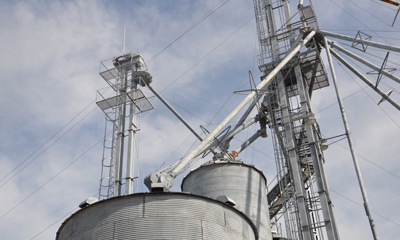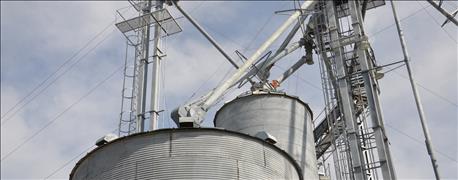
Dan Gwin designed a large part of his corn storage facility himself. He put it together over time, not all at once. And he did it as he could afford it, often using equipment he bought below cost.
“We’ve got the ability to keep up with the combine, move corn and even load out semis all at the same time,” says Gwin, Linden. “We didn’t put this together overnight; it evolved over time.”
Here are three ways Gwin found equipment that he fit into his grain handling operation at much less than full cost. It requires planning and careful shopping, but these strategies can greatly reduce costs, he says.
1. Look for usable equipment when an elevator or other grain facility phases out.

EFFICIENT AND COST-EFFECTIVE: Dan Gwin was able to build this grain center over time, often purchasing parts used at far less than full cost.
Buying junk at auctions is one thing. Knowing what you need either at the time or for future expansion — and keeping eyes peeled until you find an opportunity to buy it — is another, Gwin says. He put together part of his current corn storage and handling facility with legs, augers and other equipment he purchased when an existing facility was being phased out.
Often an opportunity arises with an older commercial elevator that the cooperative or private company decides no longer justifies staying open. Other times it may be when a company replaces a system and puts in new or bigger equipment.
Sometimes these bargains come up at auctions. Other times they are listed in newspapers or online. And sometimes it amounts to just watching, listening and knowing what is about to happen, Gwin says. The real trick is making sure the equipment is still usable — don't buy junk that is already worn out because it seems like a bargain.

SELL OFF OF OLD FACILITIES: One way Dan Gwin acquired many components for this grain bin facility was through auctions or private sale where an older operation was being phased out.
2. Let people know what you are looking for.
The scale at his corn storage facility is a prime example of letting others know what your needs are, Gwin says. He told someone in the industry that he eventually wanted to install a scale so he could weigh everything coming in and out of his facility.
One day he got a call from that person, telling him a company was upgrading and going to a bigger scale, but the scale they had was still in good shape.
“We were able to come to an agreement, and it has worked out well,” Gwin says. Part of the agreement included replacing key components and including a short-term warranty. “It still wound up being much cheaper than if I had just purchased a brand-new scale outright,” he says.
“We weigh everything that comes off the farm across the scale,” he says. “Seed soybeans go to a different facility, but the trucks still come here first to weigh. It gives us accurate production records.”
.jpg?width=600&auto=webp&quality=80&disable=upscale)
WORD OF MOUTH WORKS: Gwin found out about this scale through someone who knew he was looking for a set.
3. Rely on contacts both in and outside of agriculture.
When Gwin expanded his corn storage facility recently, he did a major upgrade on the wiring. The electrician he worked with knows someone who buys salvaged goods from various companies when they upgrade.
“He told me that this guy had some large electrical boxes that would work great for what we wanted to do,” Gwin recalls. “I was able to get them for a good price, and they do exactly what we need them to do.”
All electrical equipment is housed in a small, separate building. By running wiring from the used electrical boxes to one central control panel, he can control nearly everything in the operation with push-buttons.
Both the control panel and the electrical boxes feeding it are neatly labeled so it’s easy to see where power is coming from for each motor in the facility.
“We’re very happy with the results,” Gwin says.

RIGHT CONTACTS: Through the contacts of an electrician he worked with, Gwin purchased equipment he needed to upgrade his grain center's electrical system for a fraction of what it would cost new.
About the Author(s)
You May Also Like




